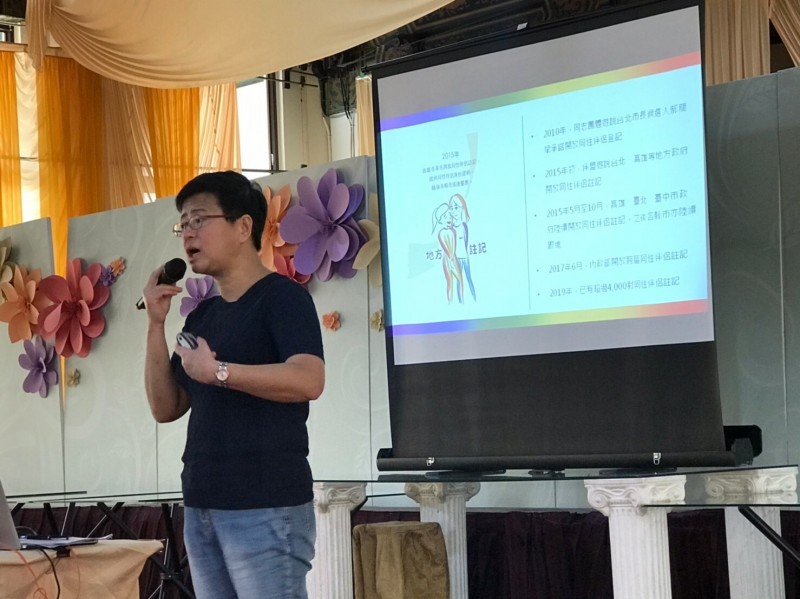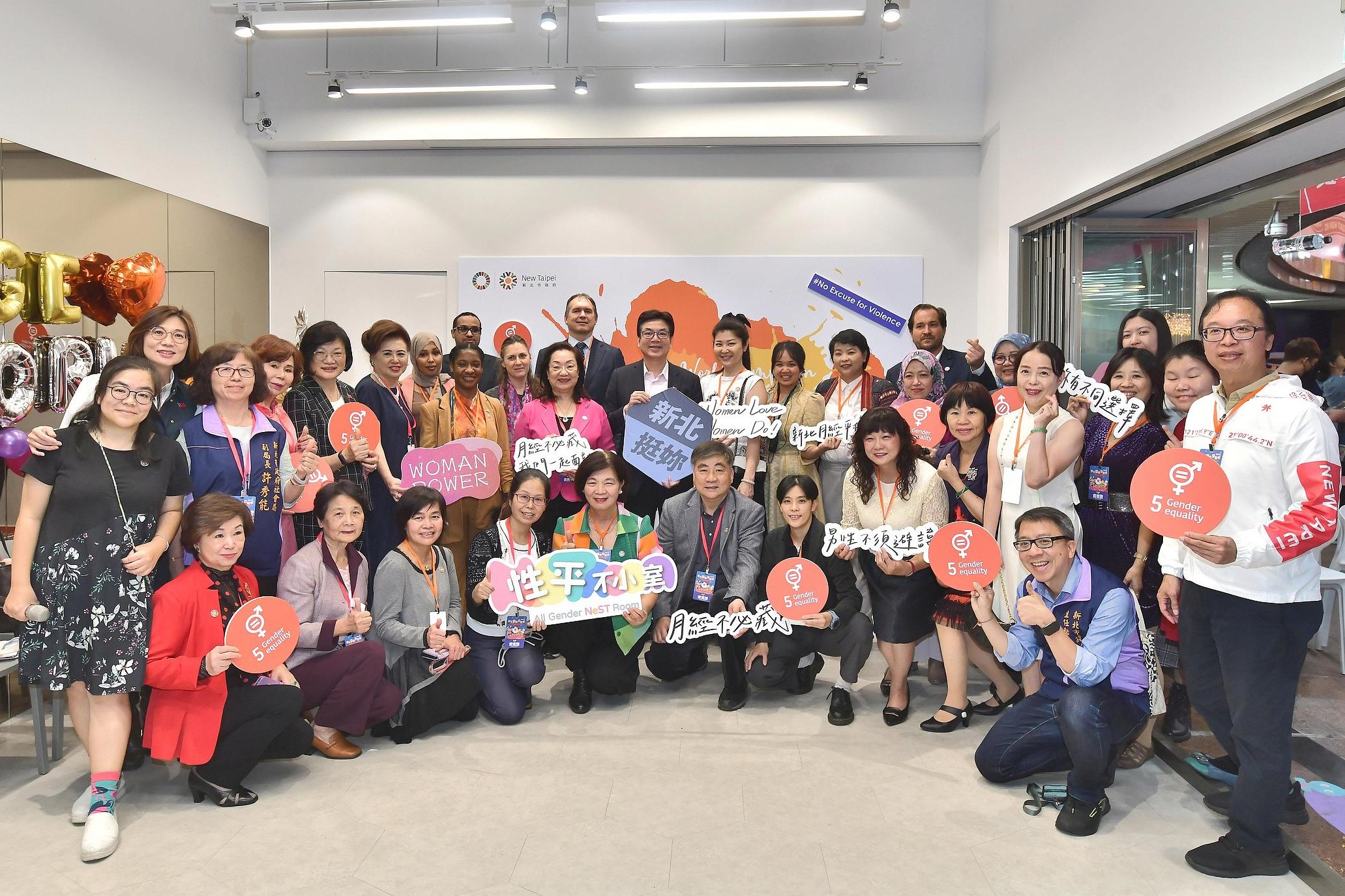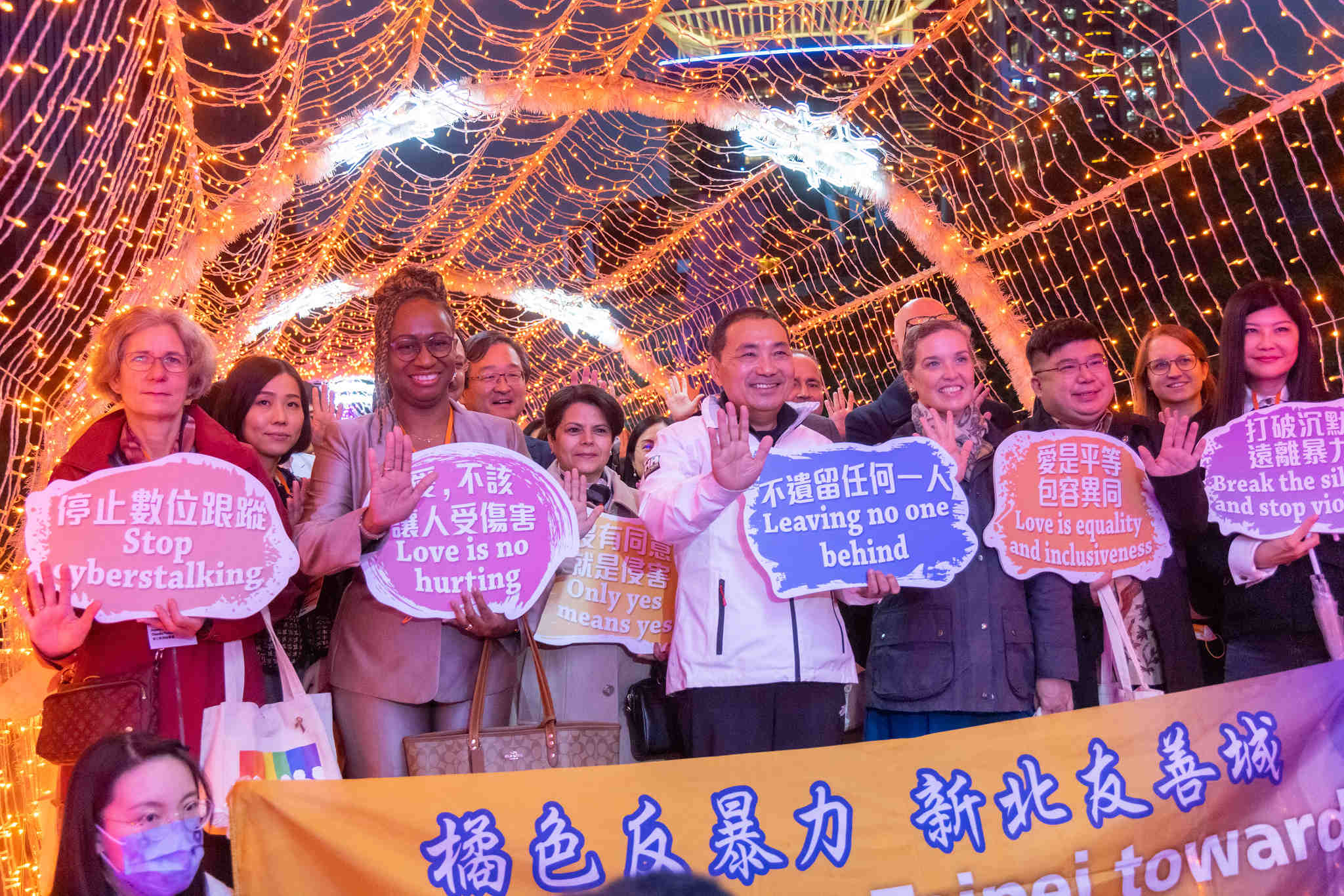
【SDG 5】Workshop for funeral service personnel: for same-sex couples
2019-10-09

In 2019, Taiwan officially became the first country in Asia to legalize same-sex marriage. More than 4,200 same-sex couples had gotten married across Taiwan by June the same year. As family structures grow to be more diverse, the Mortuary Services Office of New Taipei City held a workshop of modern funerary arrangements for same-sex couples. Receiving enthusiastic participation from relevant business operators, many of whom shared how they had dressed the deceased according to their gender identity, addressed their same-sex partner as “partner” or “spouse” on the obituary, and respected their wishes in all funerary arrangements, the workshop took the participants by storm.
Ching-chung Ko, director of the Department of Civil Affairs, New Taipei City, reported that a total of 865 same-sex couples had registered their marriage in New Taipei City by June 30, 2020, which was the highest number among all cities and counties in Taiwan. The New Taipei City Government emphasizes marital equality and is expected to, through discussion on funerary arrangements in same-sex marriage, inform relevant business operators of the needs of same-sex couples and their families. This way, the city government hopes to align funerary customs better with the modern society and promote loving and inclusive funerary customs.
Victoria Hsu, director of the Taiwan Alliance to Promote Civil Partnership Rights and also a guest speaker in the workshop, talked about how most same-sex couples, who did not have any legal family relationship to each other, made arrangements for their deceased partner as a friend rather than a spouse before the Same-Sex Marriage Law was established. Since same-sex marriage became effective, the funerary arrangements have been similar for same-sex and heterosexual couples; however, different arrangements (e.g., the title of the partner and rituals) should be planned at the wish of the family and with consideration to the opinions of different “stakeholders” so as to offer a grief-releasing and comforting funeral.
In the workshop, Ting-yu Chuang, director of Zunyuan Life Business Ltd., shared with the participants a funerary arrangement case she received from a same-sex partner last year. In this case, family members of the deceased all accepted this same-sex partner, but most of the deceased’s friends did not know about the partner. Therefore, to respect the deceased’s choice of not coming out when they were alive, Chuang reached a consensus with the partner on not revealing their role as the partner of the deceased in all public notices and occasions.
Ming-hsiang Huang shared a case in which the deceased woman’s second son had a same-sex partner; although not married, the son and his partner had been living together for years, and the partner was quite close with the family members. Therefore, the partner expressed his wish to be listed in the obituary as the “daughter-in-law,” to which the family did not have any objection. On the day of the funeral, the partner paid tribute to the deceased along with the sons and daughters-in-law. This realizes the wishes of both the alive and deceased.
ShanHo Service Inc. talked about their first time arranging a funeral for a family with a same-sex couple in it. In this case, the second daughter of the deceased had a same-sex partner. With reference to similar cases of other funeral service businesses, ShanHo listed the daughter’s partner on the obituary as the daughter-in-law after a discussion with and approval of the family.
Professor Fu-chuan Hsu, an expert in funerary customs, was invited to this workshop to talk about funerary documents and customs. In addition to funerary etiquette, professor Hsu discussed the practical adjustments to be made in the titles of family members on modern obituaries in accordance with gender equality and same-sex marriages, providing reference for funeral service businesses to hold funerals in respect of both the traditions and the family’s wishes.
Competent Authority:Funeral Office
Ching-chung Ko, director of the Department of Civil Affairs, New Taipei City, reported that a total of 865 same-sex couples had registered their marriage in New Taipei City by June 30, 2020, which was the highest number among all cities and counties in Taiwan. The New Taipei City Government emphasizes marital equality and is expected to, through discussion on funerary arrangements in same-sex marriage, inform relevant business operators of the needs of same-sex couples and their families. This way, the city government hopes to align funerary customs better with the modern society and promote loving and inclusive funerary customs.
Victoria Hsu, director of the Taiwan Alliance to Promote Civil Partnership Rights and also a guest speaker in the workshop, talked about how most same-sex couples, who did not have any legal family relationship to each other, made arrangements for their deceased partner as a friend rather than a spouse before the Same-Sex Marriage Law was established. Since same-sex marriage became effective, the funerary arrangements have been similar for same-sex and heterosexual couples; however, different arrangements (e.g., the title of the partner and rituals) should be planned at the wish of the family and with consideration to the opinions of different “stakeholders” so as to offer a grief-releasing and comforting funeral.
In the workshop, Ting-yu Chuang, director of Zunyuan Life Business Ltd., shared with the participants a funerary arrangement case she received from a same-sex partner last year. In this case, family members of the deceased all accepted this same-sex partner, but most of the deceased’s friends did not know about the partner. Therefore, to respect the deceased’s choice of not coming out when they were alive, Chuang reached a consensus with the partner on not revealing their role as the partner of the deceased in all public notices and occasions.
Ming-hsiang Huang shared a case in which the deceased woman’s second son had a same-sex partner; although not married, the son and his partner had been living together for years, and the partner was quite close with the family members. Therefore, the partner expressed his wish to be listed in the obituary as the “daughter-in-law,” to which the family did not have any objection. On the day of the funeral, the partner paid tribute to the deceased along with the sons and daughters-in-law. This realizes the wishes of both the alive and deceased.
ShanHo Service Inc. talked about their first time arranging a funeral for a family with a same-sex couple in it. In this case, the second daughter of the deceased had a same-sex partner. With reference to similar cases of other funeral service businesses, ShanHo listed the daughter’s partner on the obituary as the daughter-in-law after a discussion with and approval of the family.
Professor Fu-chuan Hsu, an expert in funerary customs, was invited to this workshop to talk about funerary documents and customs. In addition to funerary etiquette, professor Hsu discussed the practical adjustments to be made in the titles of family members on modern obituaries in accordance with gender equality and same-sex marriages, providing reference for funeral service businesses to hold funerals in respect of both the traditions and the family’s wishes.
Competent Authority:Funeral Office
Related Solutions
 Visitor:196
Visitor:196



